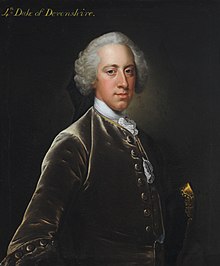William Cavendish, 4th Duke of Devonshire
William Cavendish, 4th Duke of Devonshire KG PC FRS (8 May 1720 – 2 October 1764), styled Lord Cavendish before 1729, and Marquess of Hartington between 1729 and 1755, was a British Whig statesman and nobleman who was briefly nominal Prime Minister of Great Britain.

Quotes
edit- My scheme is if possible to govern this country [Ireland] without a party and make those that receive favours from the Crown think themselves obliged to it and not to their party here: for as Lords Lieutenant are often changed, whoever has any favours to ask, endeavours to obtain it by the means of some powerful person here, and if they carry their point think themselves more obliged to the person that recommended them than they are to the government that has given it them.
- Letter to the Duke of Newcastle (4 October 1755), quoted in J. C. D. Clark, 'Whig Tactics and Parliamentary Precedent: The English Management of Irish Politics, 1754–1756', The Historical Journal, Vol. 21, No. 2 (June 1978), p. 282
- My view is to reduce the power of that office [Speaker of the Irish House of Commons] and to suffer no person or party to grow so powerful as to presume to dictate to government, and in order to do so, I would break the present parties and then keep a strict eye to prevent any others from growing too powerful.
- Letter to the Duke of Newcastle (3 February 1756), quoted in J. C. D. Clark, 'Whig Tactics and Parliamentary Precedent: The English Management of Irish Politics, 1754–1756', The Historical Journal, Vol. 21, No. 2 (June 1978), p. 282
- The plan is undoubtedly the best that could be formed, the only difficulty will be to make it hold...the utmost of my abilities are to see an administration settled that will endeavour with firmness and unanimity to extricate this country out of the dangerous situation it is in at present.
- Letter to Lord Mansfield (20 June 1757), quoted in J. C. D. Clark, The Dynamics of Change: The Crisis of the 1750s and English Party Systems (1982), p. 442
Quotes about the Duke of Devonshire
edit- Devonshire had been a moderate among men of great political passion. If scarcely a spectator in the play of events, he had never bestrode the stage. His death, coming just after those of Hardwicke and Legge, deprived the Whigs of three material men. Given health, he might have returned to office in the Crown's restless pursuit of ministers up to 1770. He had been a man with a concern for king and country. He died the acknowledged leader of the Whigs.
- Gerald Howat, 'The Duke of Devonshire (1756–1757)’, in Herbert van Thal (ed.), The Prime Ministers. Volume the First. Sir Robert Walpole to Sir Robert Peel (1974), p. 101
- Unfortunately there was no really effective secondary leaders to deputize for Pitt. The obvious man for the role, the eminently sensible and highly respected Duke of Devonshire, had died in 1764, a mortality which...left a marked gap in the ranks of the Minority...[and] effectively destroyed a generation in the 'Old Whig' leadership.
- Paul Langford, The First Rockingham Administration, 1765–1766 (1973), pp. 13-14
- [The Duke of Devonshire is] the great engine, on whom the whole turns at present.
- The Duke of Newcastle, letter (13 November 1756), quoted in J. C. D. Clark, The Dynamics of Change: The Crisis of the 1750s and English Party Systems (1982), p. 287
- He was eminently a fit man for the post; his rank as a born leader of the whigs, his experience in the House of Commons, and his popularity in Ireland all recommended him, and he was sworn in as first lord of the treasury on 16 Nov. 1756. He was not, however, a success in his new capacity; his leader of the House of Commons, Sir Thomas Robinson, only excited the risibility of Pitt, and Pitt himself soon recognised the necessity of making up his differences with the Duke of Newcastle. In May 1757, therefore, Devonshire...resigned to the Duke of Newcastle, and was appointed lord-chamberlain of the household, a post which he held until 1762.
- H. M. Stephens, 'Cavendish, William (1720–1764)', Dictionary of National Biography, Volume IX. Canute—Chaloner, ed. Leslie Stephen (1887), pp. 375-376
- The Marquis [of Hartington] was more fashioned [than his father], but with an impatience to do everything, and a fear to do anything, he was always in a hurry to do nothing. His discretion was so great that he would sooner whisper to a man's prejudice, than openly deliver a harmless opinion; and these whispers had the more effect as he was too civil ever to own himself an enemy. Nor was this all malice; if he had had reflection enough to design all the mischief he did he would have been less capable of doing it. They are the tales of the gentle and the good that stab.
- Horace Walpole, Memoirs and Portraits, ed. Matthew Hodgart (1963), p. 28